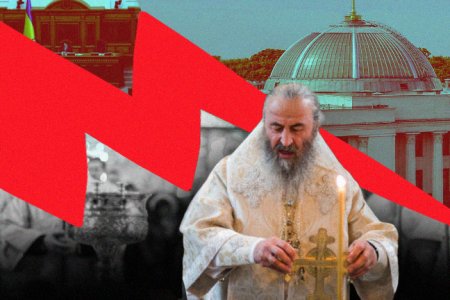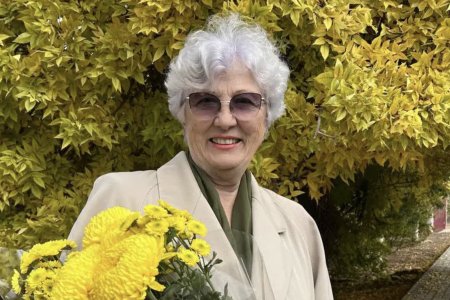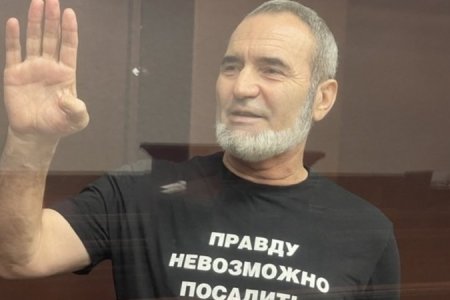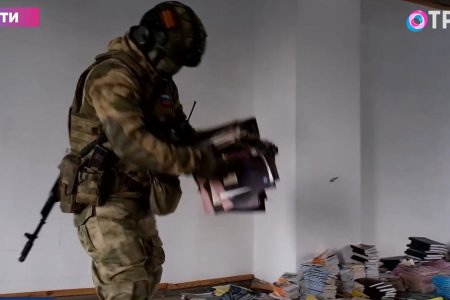![Ілюстрація: © Марія Крикуненко [заборона РПЦ] Illustration © Maria Krikunenko](https://khpg.org/files/img/1608821669.jpg)
Dmytro Vovk heads the Center for Research on the Rule of Law and Religion. We spoke with him last year when draft law No. 8371, “On Amendments to Certain Laws of Ukraine Regarding the Activity of Religious Organizations in Ukraine”, passed the first reading. Since then, several amendments have been made to the draft law, and now it is called “On the protection of the constitutional order in the sphere of activity of religious organizations”.
The law prohibits the activities of religious organizations that are affiliated with the Russian Orthodox Church or support Russian aggression on the territory of Ukraine. The State Service for Ethnopolitics and Freedom of Conscience (DESS) will issue a direction to religious organizations affiliated with the Russian Orthodox Church. If the religious organization does not stop these connections within a month (two at most), there will be a reason to go to court.
How do you generally assess this law?
The law provides for three basic things. The first is the ban on the Russian Orthodox Church (ROC).
The second is the ban on religious organizations affiliated with the Russian Orthodox Church. The law also bans other religious organizations that are affiliated with organizations in Russia if they support Russian aggression. But, based on the law’s wording, the main goal is to ban the Ukrainian Orthodox Church (UOC) or terminate its ties with the Moscow Patriarchate (MP), which obviously also means UOC disappearance in its current form.
The third is the prohibition of the ideology of the “Russian World”, which is given a sufficiently broad definition in the law. This prohibition stipulates that all religious organizations involved in the repeated dissemination of this ideology are subject to prohibition. Moreover, “dissemination by the organization” equals “ dissemination by representatives”. That is, if a priest spreads what the state qualifies as the spread of the ideology of the “Russian World” and does it at least twice, there is a reason to ban such a religious organization.
The main practical problem is related to the second component of the law. After all, international law in the field of religious freedom — in the modern sense — proceeds from the fact that religious organizations are prohibited in extreme cases when all other measures are ineffective. For this, there must be sufficient grounds proving that the organization as a whole or its management (and not individual members) is involved in an activity that is so problematic for the state, society, or other people’s rights that it should be prohibited. Second, the very idea of a ban based solely on historical or canonical affiliation is problematic because there is no need to prove any wrongdoing. The state says: We’re banning you simply because we believe you have such connections, regardless of whether or not you’ve committed any illegal acts. The state does not even have to prove that such affiliation leads to the ROC controlling or determining the actions of the UOC. At the same time, human rights law is based on the fact that such severe restrictions should be applied only as a result of illegal activities. Such a ban creates tension between the purpose of the law and international standards of freedom of religion and belief.
In simple terms, what exactly are the connections in question?
The law contains 7 criteria for affiliation. It is, on the one hand, about the involvement of the Ukrainian religious organization in the activities of the Russian Orthodox Church. An example is participation in its governing or any other bodies. On the other hand, the ROC recognizes the Ukrainian organization as its part. The law includes the following: if the statutory or other documents of the Russian Orthodox Church mention a Ukrainian religious organization, this is enough to conclude the affiliation. If Moscow Patriarch Kirill blesses priests or leaders of a Ukrainian religious organization, then this organization is automatically part of the Russian Orthodox Church. A curious situation is being created: on the one hand, the UOC, historically associated with the MP, declares that it is not part of the MP, as this church declared at the council in May 2022. On the other hand, the state prefers to rely more on what the ROC thinks about the UOC than on what the UOC thinks about itself.
Among the signs of “affiliation of religious organizations” is “subordination in canonical and/or organizational matters.” But “canon” is not a legal term...
That’s right. The political practice of Orthodox countries often follows such a path that the state frequently interferes with the internal aspects of religious life, particularly the canonical territory. However, from the point of view of religious freedom, the state’s involvement in resolving canonical disputes is problematic. In particular, the European Court of Human Rights (ECHR) emphasizes that in the event of a split within a religious group, the state should not take the side of one of the competing groups. In addition, if the issue of the ban due to affiliation (without proving any illegal actions or authentic ROC leadership of the UOC) will end up in the ECHR (for example, due to the loss of their church premises by the UOC communities), then it is naive to think that these cases are entirely hopeless.
Please describe the legal mechanism by which the UOC MP will be banned. After the decision of the expert commission, will religious organizations be given 9 months to sever ties with Russia?
It is not quite so. Nine months are given for the amendments to the Code of Administrative Procedure to enter into force. They simplify the procedure for liquidating a religious organization. Accordingly, in 9 months, the state can start legal proceedings liquidating such organizations. (However, there is also a general procedure for liquidating a religious organization because we already have regulations that allow us to file similar lawsuits). The process of recognizing religious organizations as affiliated with the Russian Orthodox Church can begin when the law enters into force a month after its promulgation.
The procedure is structured so that the state (represented by the State Service of Ukraine for Ethnopolitics and Freedom of Conscience — DESS) must determine the list of organizations related to the Russian Orthodox Church. DESS can (but is not obliged to) conduct a so-called religious examination, which will prove such a connection. After that, the Service must publish on its website a list of organizations connected with the Russian Orthodox Church and issue an order to these religious organizations to terminate such connections within a month (in some cases, this period can be extended to two months). If the organization has not terminated these connections, there is a reason to apply to the court.
After adopting the law, such a lawsuit may be filed by the State Service for Ethnopolitics and Freedom of Conscience or the prosecutor’s office. This simplifies the procedure: if the DESS is limited in human resources, more people in the prosecutor’s office can join this process. An interesting novelty is that the jurisdiction of such cases is determined in the appellate administrative court in the appellate district, which includes the city of Kyiv. That is, all cases related to the liquidation of religious organizations should be considered only by this court as a court of first instance. This creates an additional burden on the court if the lawsuits are massive. And, of course, religious organizations in other regions will have significant difficulties representing their interests.
You wrote on your Facebook page that the law does not guarantee the objectivity and independence of the experts who establish the connection between the UOC and the ROC, and selecting these experts is instead an internal matter of the DESS. In addition, the law allows the liquidation of UOC communities even for minor violations. How do you assess the risk of abuse?
First, religious expertise is a somewhat controversial institution. It has a rather bad reputation in the post-Soviet space. In authoritarian post-Soviet countries, such as Russia, Belarus, or Central Asian countries, religious expertise is one of the effective ways to put pressure on religious minorities.
Secondly, determining the subject of such an examination is often challenging when it begins to be used to solve legal cases.
In fact, this examination solves not so much religious but theological and ecclesiastical legal issues because the canonical connection is a question of theology and canonical (church) law, not religious studies. The material with which theologians and canonists work is ancient, often confusing, and associated with various interpretations of certain canons. This leaves an almost unlimited field for experts to interpret and reach a conclusion they (or the state) see fit.
Thirdly, the examination of the Ukrainian Orthodox Church’s affiliation with the Russian Orthodox Church, which the state has already conducted, raises questions of objectivity. It is obvious that many experts involved in such examination are connected with another Orthodox church — the Orthodox Church of Ukraine (OCU). Suppose we abstract from the situation and imagine that this examination is forensic and economic and concerns one business enterprise where the experts are from the orbit of a competing enterprise. In that case, it seems that many people will object to such an approach because impartiality is a fundamental principle of expert activity. At the same time, this did not become a significant argument for DESS, as the Service did not see any problem with such a selection of experts.
Isn’t the law very situational and aimed exclusively at the current status?
The authors of the law and those who support it do not hide the fact that, in the end, it is actually about one specific issue — to ban the UOC. The ban on the ROC is primarily political and symbolic. It is rather an act of condemnation that the Russian Orthodox Church and Patriarch Kirill are involved in justifying and directly carrying out aggression against Ukraine. Such a ban will not help practical issues related to the ROC — in particular, bringing them to justice in the context of participation in an aggressive war or the involvement of this church in the indoctrination of Ukrainian children forcibly relocated to Russia. The practical purpose of the law is to resolve the UOC issue. And the law’s authors justify this not simply by considerations of security in its political or military sense but by the fact that Ukraine needs, as President Zelensky said, “spiritual independence”, spiritual decolonization. In this context, the law is on par with those laws that, for example, remove the Soviet and Russian heritage from the public space of Ukraine, provide for renaming streets toponyms, revision of the school curriculum, etc. The problem, however, is that if street renaming concerns the regulation of symbolic reality, then the law we are currently discussing affects the lives of specific people — believers who prefer to be in the Ukrainian Orthodox Church.
Could this law later affect other denominations and churches?
Of course, the question arises of whether this law is exclusively about the Ukrainian Orthodox Church or whether it is about a fundamental change in the state’s approach to regulating religious relations from a more neutral and aloof to a more intrusive one. Now, it looks like, at least from the president’s point of view, that this is exclusively about the UOC. But there are two points worth noting.
First, in post-Soviet history, strengthening the state in the field of religion is always a one-way street. There was no precedent for a state to increase its presence and powerful influence in religious relations and then return to a previous state of neutrality. Therefore, I think that as a result of the law, we can get increased interference in the activities of the Ukrainian Orthodox Church and a general change in the approach to regulating religion and granting the state greater powers and discretion in this area. Sooner or later, this may affect other religious groups, especially minorities.
Secondly, suppose the structure of the UOC is destroyed. In that case, only one Orthodox Church will remain because most communities will have no other realistic option than joining the OCU. In such a situation, state-religious relations in Ukraine will become closer to what we have in other countries with an Orthodox majority. These are, for example, Georgia, Romania, Bulgaria, Greece, etc. Orthodox countries are characterized by a special relationship between the state and the majority Orthodox church: the state supports and protects this church and limits religious competition in favor of the majority religion. It certainly affects religious freedom and freedom as a state of social life. In Orthodox countries, we often encounter formal or informal restrictions on registration for religious minorities or on the possibility of obtaining land and building a religious building. Similarly, in Orthodox states, the autonomy of the state and the church is more easily eroded, particularly in the sphere of education and public life.
It is essential to understand that after gaining independence, Ukraine championed religious freedom among the post-Soviet states. Our situation has always been one of the best, which two fundamental factors can explain. The first was the split of Orthodoxy when we had two competing Orthodox churches. They were in such serious competition that they lacked the power and the time to somehow influence religious minorities — for example, to limit their access to the country, as has been happening since the late 1990s in Russia, where the Orthodox Church has played an essential role in the fact that the Russian Federation gradually turned into one of the biggest violators of religious freedom in the world. The second factor was that due to the specificity of the political system and a certain decentralization of political power in the country, the Ukrainian state has always been a weak point in changing the religious landscape significantly. Although different presidents of Ukraine supported different Orthodox churches and treated other religious communities in Ukraine differently, the political situation never allowed them to achieve stable institutional dominance of one Orthodox church.
In your opinion, what are the consequences for society and the country of increased intervention of the Ukrainian state in religious affairs?
There is a radical scenario in which the state will completely destroy the structure of the UOC. For this, it is unnecessary to ban all 8,000 communities that currently belong to it. For this, we must destroy the governing bodies, particularly the Kyiv Metropolis and some individual regional metropolises, and the system will crumble further. Another less radical scenario is that the state will try to separate the UOC from the Moscow Patriarchate and achieve its existence in another format. However, so far, no realistic (that is, one that can be implemented practically) scenario has been publicly voiced. In addition, it seems extremely unlikely that the UOC and the OCU can agree on some form of unification, mainly because neither of these churches is interested in such a unification.
Depending on which scenario the state chooses, there will be inevitable consequences. If competition between Orthodox churches continues, religious freedom and religious pluralism in Ukraine will be benefited. (Although I understand that for many Orthodox, the unification of the Orthodox Church inside Ukraine would be an important step). If the state goes for a more radical scenario, the structure of the UOC will be destroyed, and most communities will join the OCU. This will create a challenge for religious freedom in Ukraine — both for believers who belong to the UOC and for Ukrainian society in general. We are already seeing statements by both people’s deputies and local councils that the UOC is “already banned” and that the UOC community should be deprived of its property and registration. Such statements are inconsistent with the provisions of the law adopted by the Verkhovna Rada. They are directed against specific people, not “leaders of the UOC” or “connections between the church and the ROC,” as supporters of the law claim.
In addition, the entire discussion surrounding the law on the UOC, which we have been observing for the past year and a half, shows the desecularization of Ukrainian politics because this discussion is being conducted politically and theologically. Concepts such as spiritual independence, canonical territory, spiritual decolonization, and the (im)possibility of an “another Thomas” replaced the secular discussion of issues of religion and national security (in particular, did the activities of the Ukrainian Orthodox Church affect such things as mobilization and military potential? Have they led to mass unrest? Has its leadership been involved in crimes against national security, such as collaboration, etc?) And, of course, there is a certain irony in the fact that such politico-theological discourse is promoted by Volodymyr Zelenskyi, who has been and, I suspect, will be the most secular Ukrainian president in the near future.



